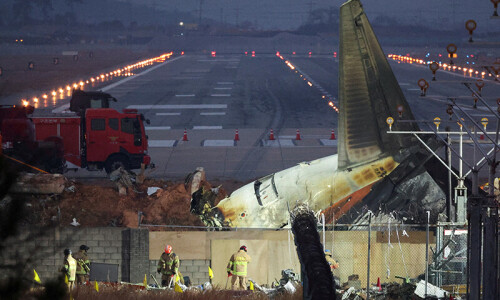Indo-Pak trade potential stands at $37 billion: World Bank

ISLAMABAD: India and Pakistan have merely scratched the surface of their bilateral trade potential, as a World Bank report released on Monday estimates that trade between the two countries today is a mere $2 billion whereas without trade barriers, this could reach $37bn.
The report, “A Glass Half Full: The Promise of Regional Trade in South Asia” says the lack of normal bilateral trade relations between the two countries affects the formation or deepening of regional value-chains in various high-value trading sectors.
The reports has highlighted among key factors, the long list of product restrictions in bilateral trade. India and Pakistan continue to maintain long, sensitive lists of items on which no tariff concessions are granted.
Pakistan has a list of 936 items and almost 17.9pc of tariff lines that apply to imports from all Safta countries. India maintains a list of 25 items (0.5pc of tariff lines), which includes goods such as alcohol, firearms, etc.
However, it has a much longer, 64-item list, (almost 11.7pc of tariff lines) for Pakistan and Sri Lanka, but which effectively applies only to Pakistan, because India applies a smaller sensitive list to Sri Lanka as part of a separate India-Sri Lanka Free Trade Agreement.
Items on the Indian sensitive list can be imported at the most-favoured-nation tariffs from any Safta country, including Pakistan, because India accorded Pakistan the status in 1996, soon after the accession of the two countries to the World Trade Organisation. However, Pakistan has not granted India the most-favoured-nation’s status or non-discriminatory market access.
In addition, the preferential access granted by Pakistan on 82.1pc of tariff lines under Safta is partially blocked in the case of India because Pakistan maintains a negative list comprising 1,209 items that cannot be imported from India. In practice, many of these items are exported from India to Pakistan through a third country, usually the United Arab Emirates.
The report says another barrier to bilateral trade is the proliferation of NTMs (non-tariff measures), some of which take the form of non-tariff barriers, such as port restrictions.
Pakistan allows only 138 items to be imported from India over the Attari-Wagah land route. Furthermore, cargo trucks from either side cannot move beyond their border zones, which means that goods must be transloaded at the border, adding to the time and cost of trading.
Another factor impeding bilateral trade in goods and services, as well as FDI, is the encumbered visa regime that India and Pakistan have created for each other, which restricts the mobility of people between the two countries.
Continued political tensions and lack of normal trade relations between India and Pakistan have cast a shadow over cooperation efforts within South Asia, contributing to the lack of progress in the regional cooperation agenda of Saarc and Safta, the report says.
Published in Dawn, September 25th, 2018














































